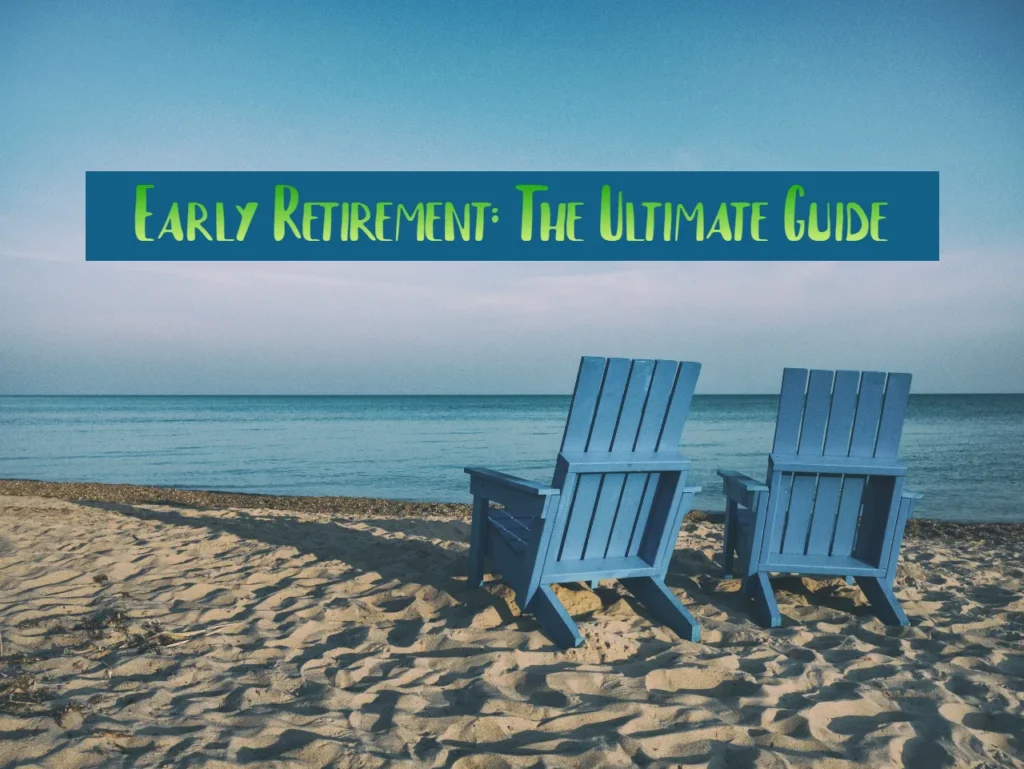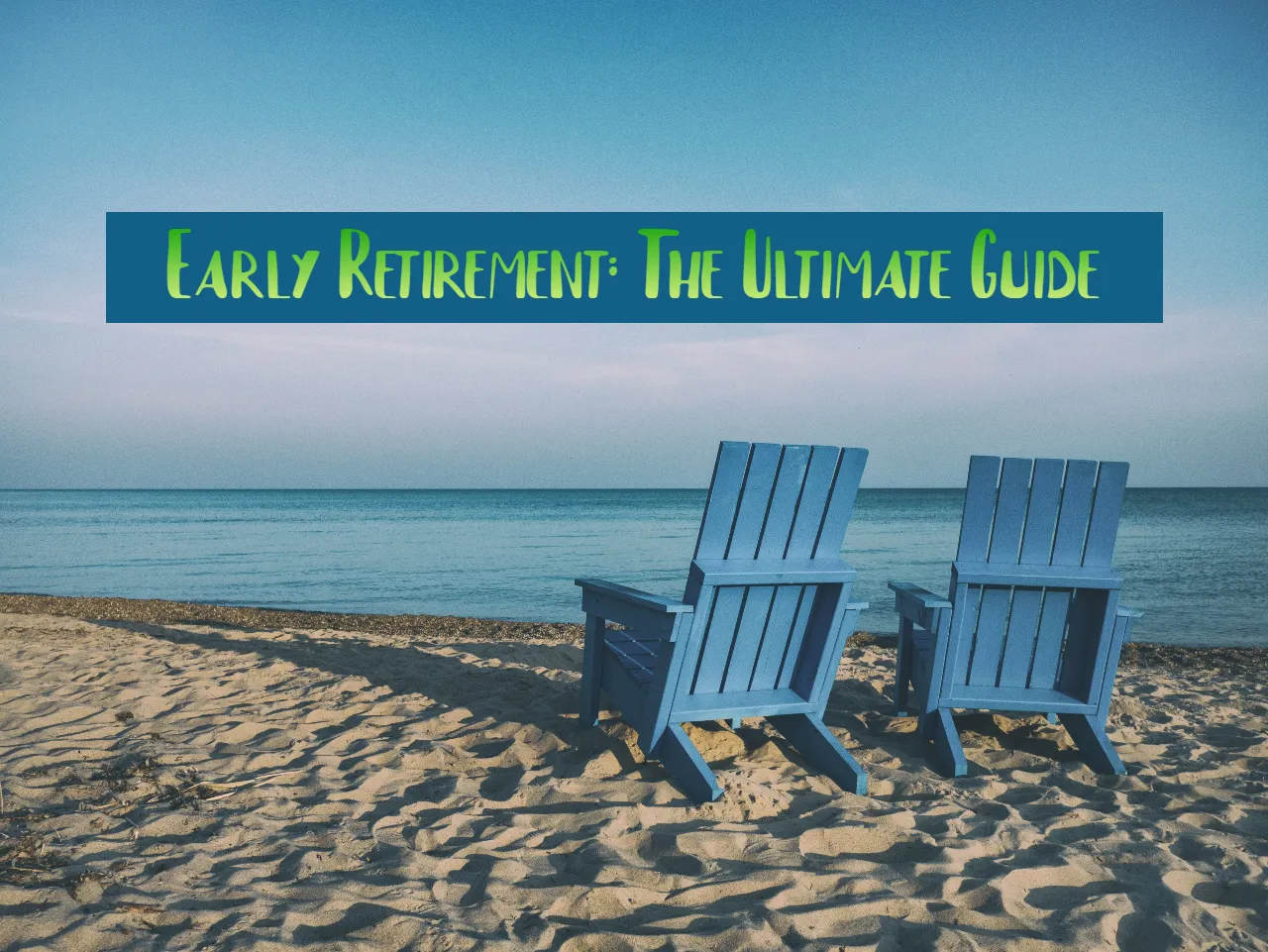For many people, the idea of being able to retire in their 30s or 40s sounds like a dream come true. However, retiring early can also seem like an unattainable goal, especially if you have student loan debt and other pressing financial obligations that keep you chained to your job.
You don’t need millions of dollars or the right connections to make early retirement a reality, however; what you do need is the right mindset, solid information, and discipline to get you there faster than expected! This guide will help you do just that!
How do you envision early retirement?
There’s nothing better than waking up each morning and not having a boss or schedule. Early retirement allows you to wake up whenever you please, enjoy hobbies, travel the world, and do anything and everything that you’ve been dreaming of.
I imagine it as going on an endless vacation every day! It also feels like my life is just beginning now that I’m no longer following someone else’s plan for me.
For example, early retirees often have greater health and well-being because they can focus more on what they want rather than what their employer wants them to be doing at any given time. They have increased leisure time which can lead to a reduction in stress levels.
And, perhaps most importantly, people who retire early tend to live longer lives with fewer medical problems such as heart disease and diabetes.
In your view, what is early for you? Is it 55 or 65? Secondly, you need to consider how much retirement will cost you. For instance, will you spend less in retirement than financial advisors lead you to believe? Can you supplement your retirement lifestyle with savings and investments? Do you plan to get Social Security or a pension?
A holistic retirement and financial plan can help you determine where you are today and illuminate a path to early retirement.

Make your retirement a “to” not a “from”
As we grow up, many of us are taught that having a retirement is something that you leave for after your working years. You may think okay when I stop working then I’ll retire.
So now you’re in your 20s or 30s and you just can’t wait to retire so you can have all the time in the world and do what YOU want. Well, while that sounds like an amazing idea, in theory, it’s not as easy as it seems.
Before you start planning out your life without work and how much fun things will be without bosses telling you what to do – it’s important to know the reality of retiring early.
Yes, it can be a great feeling to think about how you will finally be able to do what you want and not have someone else tell you what to do.
But before you start daydreaming about living in a beach house for the rest of your life, some things need to be considered when making early retirement plans. Because it might not always turn out like you think it will and there are some risks involved if you retire too early.
How Retirement Calculators Can Help You Decide When to Retire
While you may have a ballpark figure in mind of when you would like time to retire, it can be a challenge to pinpoint an exact date.
This is because several factors will affect your decision, such as the availability of qualified retirement benefits and the amount of wealth one has amassed.
A retirement calculator allows for inputting personal information related to savings rates, expected return on investment, and inflation rates.
Consult with a Financial Adviser or Coach
It can be challenging to make all the necessary decisions on your own. Especially when it comes to a life-changing event like retirement.
To make sure you’re on the right track, consult with a financial adviser or coach who is both well-versed in retirement and has your best interests at heart.
They will review your finances and help you identify any changes that need to be made before retiring. For example, do you have enough saved up for retirement? Do you have investments that are doing well? Is there anything about your current lifestyle that needs to change for this new phase of life to work out?
Prepare Your Meals to Keep Yourself and Your Wallet Healthy
Preparing your meals, rather than eating out, can reduce costs and make sure you have access to healthy, nourishing food. Meal prepping is a good idea if you need food for an entire week or more- it’ll allow you to give your body variety and help you spend less on groceries.
To get started, figure out how many meals you want to prepare and what type of foods you’d like for each meal. If you plan to only cook for one person, pack about four servings per meal in containers that are easy to carry with you.
Then, find recipes online and plan out the number of servings from each recipe based on the size of the container that it will be going into. Lastly, use those containers as your guide when shopping at the grocery store so that you buy enough ingredients for all the meals.
You Should Have a Side Hustle
One of the most common questions I get asked is How can I afford to retire early? Without a side hustle, it is impossible. Early retirement usually involves a lot of lifestyle changes, and depending on what you do for work, it could be difficult to make this transition.
If you’re thinking about retiring from your job and living in the U.S., then finding a part-time or full-time job outside of your current career field might be necessary. You’ll have to consider the benefits, salary, and hours required before making that decision.
For some people though, working as a freelancer will be the best option. Working as a freelancer will allow you to choose when and where you want to work as well as what type of clients you want to take on.
Invest in index funds with low costs
Now that you know what your goal is, it’s time to figure out how you’re going to make it happen. There are two broad ways of doing this: with saved money or with a paid-off mortgage.
Purchasing investments may seem daunting if you don’t know much about them, but fortunately, there are index funds for every type of investor. Index funds provide low-cost exposure to the entire market through passively managed fund portfolios.
They can also be customized based on an individual’s risk tolerance and objectives to best fit their needs. Some other benefits of investing in index funds include access to professionally managed assets, diversification, and liquidity.
Plus, they don’t require any ongoing management so you won’t have to worry about fees being taken out of your account every year
Smart Shopping
The first step in early retirement is saving. There are several steps you can take to reduce the amount of money you spend on groceries, including learning how grocery store aisles are laid out and have an idea of what it will cost before going shopping.
Plus, you should know which stores have the best deals and what times they’re available – running errands during off-peak hours will save money. You might also want to visit sites like Hip2Save or CouponMom for tips and coupons from other shoppers.
On the same note, there are things you can do to avoid impulse buys as well; be sure not to bring your wallet into a store if you’re just browsing!
And when buying groceries online, make sure you read reviews carefully so that you don’t accidentally buy expired items or foods that won’t last until your next trip to the store.
Choose the Right Investment Accounts
The first step is making sure you’ve found the right investment accounts for your goals. With a variety of options available, it’s crucial that you set aside time and do your research. Which type of account is the best?
How much should I invest? Which provider is right for me? There are so many questions to answer when it comes to what’s right for you and your investments!
That’s why we’ve put together this ultimate guide to make things easier. Here are some helpful tips on how to choose the right investment accounts for your needs and where to start with saving money!
-If you have an employer-sponsored retirement plan like a 401(k) or 403(b), take advantage of these plans because they provide great tax benefits. For example, contributions may be made pre-tax so they grow faster than they would in an after-tax account like a Roth IRA or traditional IRA.
-If you want to use an online brokerage firm as your brokerage firm, then check out Wealthfront as one option. Wealthfront is known for low fees and efficient investing.
Consider Getting Health Insurance
First, find the health insurance coverage that will best meet your needs and budget. It’s important to carefully read through the details of any plan you’re considering since they can vary widely in terms of what is covered and the out-of-pocket expenses involved.
Some people opt for catastrophic coverage or have a Health Savings Account (HSA) as their primary source of insurance; others carry secondary insurance with larger provider networks and lower deductibles.
For those who are trying to save money on premiums, make sure the policy covers pre-existing conditions before purchasing. Regardless of which type of plan you choose, it’s always a good idea to look into dental and vision plans if these services are not included in your basic package.
Establish Multiple Sources of Income
For many people, their retirement funds are a large portion of their net worth. If you have one source, it’s very risky. You need more than one source to protect yourself and ensure that you will always have money coming in.
One way is through part-time work that brings in extra income. Another way is by starting a side hustle or finding other creative ways to make money outside your 9-5 job. As an example, I took my hobby of handcrafting jewelry and turned it into a successful business on Etsy.
By creating multiple sources of income (with different risk levels), I was able to retire early with enough financial security to continue doing what I love!
Change Zip Codes to Reduce Your Cost of Living
Reducing your cost of living is a key component of early retirement. Lowing your expenses can allow you more freedom in where you choose to live as well as the type of lifestyle you can afford. Start by identifying what money goes out each month for things like rent, food, gas, etc.
You may be surprised at how much money could be saved by simplifying and cutting back on what you’re spending your money on. From there, consider relocating to an area with lower costs of living that aligns with your interests.
Take a vacation at an affordable price
Many of us want to retire early and enjoy the relaxation that life affords after a lifetime of work. For some, it is a fleeting dream, whereas for others it is the driving force behind their personal goals.
However, early retirement can seem like an impossibility when we try to calculate how much money is needed to save enough for it. If you have not calculated what you will need for your dream of retirement, read on for a few tips on making your goal come true.
Make sure to budget for taxes at the end of each year, as well as any other expenses you may incur such as healthcare costs or vacations.
If your employer offers a 401k plan, make sure to take advantage of it. They often offer matching contributions which will help you build your nest egg faster than if you were just putting money away yourself.
Get Out of Debt
If you’re in debt, stop all unnecessary spending immediately. Figure out how much you can live on and pay that amount each month while paying off your debt. Payments should be at least 25% of what you earn, except for housing (minimum of 10%).
Cut up your credit cards and don’t open any new ones. Create a budget, stick to it, and be sure to track your progress by monitoring your checking account online regularly. Re-evaluate your priorities and make necessary changes.
Put a plan in place for emergencies, retirement savings, and college funds for children or grandchildren. For example, have enough cash set aside for three months of living expenses just in case something happens to reduce income like getting laid off or sick – this will help keep creditors from coming after your assets.
Learn From Others
Whatever your dream retirement may be, early retirement is something that you’ll want to plan for and put a lot of thought into. Many people have started their blogs on the topic with some even becoming very popular in this niche.
You can learn how someone else became an early retiree by reading posts by those who have retired. You can do the same! All you need is determination and motivation.
Even if you don’t know what your future self will want, it’s better to save now while you’re young so that you’ll be able to live comfortably when the time comes. If there are any topics that I didn’t cover or answer any questions in this post then please leave me a comment below and I will reply as soon as possible.
Create an Emergency Fund
An emergency fund will help you deal with issues like unemployment, and medical emergencies, and just need a few thousand dollars for a specific purchase. It should be based on your monthly income and will typically range from three months’ worth of pay up to six months’ worth of pay.
For example, if you make $30,000 per year (before taxes), aim for an emergency fund of between $9,000-$12,000. In short—it’s better to start small now and work your way up later.
Automate Your Finances
If you want an easy way to make sure you’re saving as much as possible for retirement, the automatic deposit is the key. For most people, this means setting up an employer-sponsored 401(k) or pension program or opening a tax-advantaged IRA (Individual Retirement Account).
You can also ask your bank about opening a Roth or traditional IRA. The difference between these two accounts is their tax implications. With a Roth IRA, contributions are not deductible but qualified distributions are generally not subject to federal income taxes; with a traditional IRA, contributions may be deductible and qualified distributions are generally taxable.
It’s important to know that all of these accounts require some sort of paperwork from your employer and financial institution if you have one – but it’s worth it in the long run!
Establish a Life Outside of Work
With two-thirds of all Americans living paycheck-to-paycheck, it is increasingly difficult for people with kids and spouses who are making ends meet. But there are steps you can take to make this dream a reality–today.
Take some time this week and complete the following tasks that can set you on your way toward early retirement.
1) Create a budget. What will your monthly expenses be? What is one expense you might cut? How much do you spend in total on entertainment? One of the best ways to save money is by rethinking how we spend our discretionary income because everything from going out for dinner every night to purchasing $5 lattes every morning adds up!
2) Make five financial goals for the next five years. Where do you want to be financially in five years? Do you want to own a home? Do you want to start saving for college tuition or an emergency fund? Would you like to start paying off debt or build an investment portfolio? Once these goals have been established, create small steps to help them become realities.
3) Begin saving for retirement. For example, if you’re 25 years old, you should be aiming to save around 10% of your salary each year. That’s only about $2,000 right now but it should increase over time as your salary grows. If you’re 40 years old and earning twice as much as when you were 25, then aim to save 20% of your salary annually. Remember: the sooner you start saving for retirement the more options you’ll have when it comes time to retire.
Avoid Telling Yourself Big Money Lies
Every day, I see posts on Facebook and Instagram about how a certain blogger has given up her life and is now living in paradise as a stay-at-home mom, content to spend her days reading, cooking, and cleaning. It’s easy to believe that life can be that simple and beautiful—as if we only need more time.
But, three big money lies might stand in the way of your dream early retirement
1) You’ll never make enough money
2) You don’t have the skills
3) You’re too old. Let’s debunk these myths so you can finally live the best years of your life!
Be Mindful of Your (Financial) Behaviors
Be mindful of your financial behaviors. Early retirement is an appealing prospect for those who are sick of their 9-5 routine and have the resources necessary to make it happen.
But, the thought of never working again can be scary, especially when you consider the responsibility that comes with not having a steady income. It’s important to consider what other sources of income you might need once you quit your job.
Some individuals may want to continue freelance work on the side, start consulting or teaching classes at universities, or take on part-time jobs.
If this sounds like something you’re interested in doing post-retirement, then plan accordingly by saving up money over time and setting aside funds for taxes that could go into effect if your living situation changes significantly.
A Handful of Tips to Earn More, Spend Less, and Build Savings
Here are some quick tips on how you can get started on the road to a better future. Consider these guidelines while you develop your strategy and see what works best for you.
Increase your income by at least 10% each year to maintain your desired lifestyle.
Automate saving so that you don’t have any unplanned spending that could derail progress or slow progress. If you are trying to save more and spend less, here are a few tips that may help:
- Declutter. Get rid of the items in your home that you haven’t used in a year or longer. Even if you end up donating these items, their presence will remind you of how much stuff you have and make it difficult for your brain to consider parting with anything else. Sometimes getting rid of things is just as important as buying new things because they allow us to focus on what’s important.
- Create a no-buy list where you take note of the products that have worked well for you over time and pledge not to purchase them again until they’ve been discontinued (unless they’re unavailable). You’ll also need a want list where you note all the items that look appealing but would not serve your long-term goals (at least right now). In many cases, you’ll find that simply eliminating the desire to purchase something will decrease your desire to purchase it.
Focus on What You Can Control
Oftentimes, one of the biggest barriers to early retirement is income. However, there are many ways you can minimize your expenses so that they match your level of income. Below are a few ideas for lowering your expenses.
-First, build an emergency fund. Consider storing some funds in a liquid savings account while others go into higher-risk investments like stocks or bonds.
-Second- put your home on the market and rent it out instead of living in it yourself. If you do decide to live in it, get rid of any excess furniture, sell anything extra you have lying around and look for areas where you can lower utility bills by turning off unused lights or appliances.
-Third- pay off debt. If this means less spending money at first, look for more frugal alternatives to spend your free time with friends and family as well as cheaper hobbies like gardening or reading which will save money in the long run because they’re cheaper than going out all the time.
Wrapping Up
The best part about retiring early is being able to live your life the way you want without the constraints of a day job. With proper planning and an understanding of how your finances will work in retirement, early retirement can be a reality for anyone who wants it.
While this may seem intimidating at first, it’s not that difficult if you’re disciplined with your savings and willing to make adjustments where necessary. And when you look back on all the time saved by not working until the traditional retirement age, it becomes clear that there are many benefits to retiring early!






















